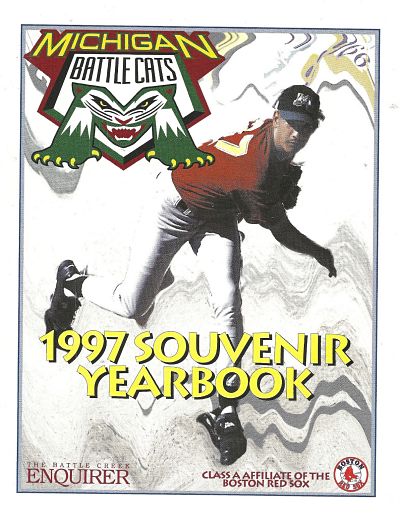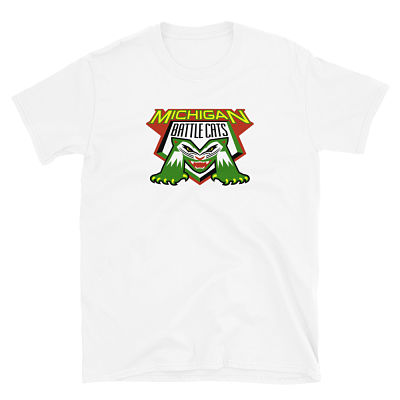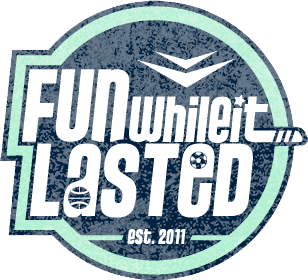Tombstone
Born: September 14, 1994 – The Madison Hatters relocate to Battle Creek, Michigan
Re-Branded: 2003 (Battle Creek Yankees)
First Game: April 7, 1995 (L 5-4 @ Fort Wayne Wizards)
Last Game: September 5, 2002 (L 9-6 vs. Lansing Lugnuts)
Midwest League Champions: 2000
Stadium
C.O. Brown Stadium (6,200)11995 Kane County Cougars Program
Dimensions (1997): Left: 322′, Center: 402′, Right: 333′21997 Michigan Battle Cats Media Guide
Ownership & Affiliation
Owners:
- 1995-2000: William L. Collins III, Tim Cullen, et al.
- 2000-2001: Michael Savit & Jeffrey Savit
- 2002: Michael Gartner
Major League Affiliations:
- 1995-1998: Boston Red Sox
- 1999-2002: Houston Astros
Attendance
Tilting your mobile device may offer better viewing.
Source: The Encyclopedia of Minor League Baseball (3rd ed.), Lloyd Johnson & Miles Wolff, 2007. Pages 660 – 702.
Best Seller
We earn commissions from purchases made through links in this post
Michigan Battle Cats Logo T
Buy Today at American Retro Apparel!
Background & Name Controversy
Once upon a time, there was a new minor league baseball entry in the Midwest League to be known as the Battle Creek Golden Kazoos. Locals took a dim view of the name – hated it, actually. But the absentee owner lived in Virginia and it’s not clear that community uproar alone would have been enough to silence the Golden Kazoos.
Enter local oddball George Hubka. Kazoos officials were slow to register their name after the November 1994 announcement. Hubka swooped in and poached the trademark in December. Hubka claimed, at the time, that he intended to use the Battle Creek Golden Kazoos name for a co-ed barnstorming baseball team. The parties headed to court. Less than a month before Opening Day, team officials took a mulligan on the name. They unveiled the ‘Michigan Battle Cats’ name on March 9th, 1995 along with a somewhat hideous new logo (top right).
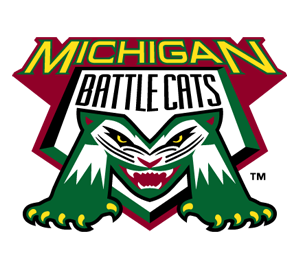
Pitching Studs & A Midwest League Crown
The Battle Cats advanced to the 1995 Midwest League championship series in their debut season. They were swept in three games by the Beloit Snappers. The team drew 171,794 fans to C.O. Brown Stadium this summer. The franchise would never again equal that number during twelve years in Battle Creek.
After four years as a Boston Red Sox farm club, the Houston Astros became the Battle Cats’ parent club in 1999. The 1999 Battle Cats squad had a spectacular starting rotation that featured future Major Leaguers Roy Oswalt (13-4, 4.47), Tim Redding (8-6, 4.97) and Johan Santana (8-8, 4.67). Oswalt became a three-time All-Star and earned the second most Major League wins in Houston Astros history. Santana became a two-time American League Cy Young Award winner with the Minnesota Twins.
In 2000, the Battle Cats won their first and only Midwest League championship. They swept the Beloit Snappers in three games in a rematch of the 1995 Midwest League finals.
Crowds at C.O. Brown Stadium dropped precipitously after the team’s inaugural season. The Battle Cats changed hands several times and none of the team’s three ownership groups were local to Michigan. Attendance bottomed out at 66,088 fans in 2001, a 60% drop from the team’s peak in 1995. The figure placed the Battle Cats next-to-last in the 14-team Midwest League in 2001.
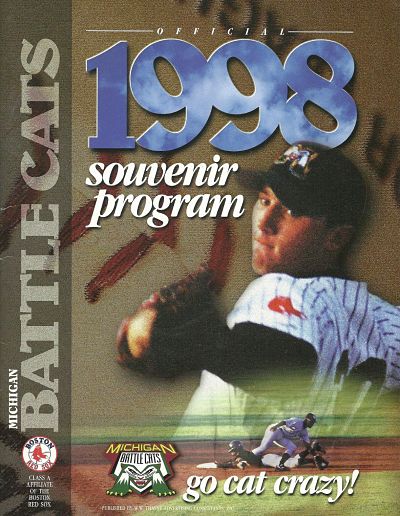
Re-Branding & Demise
Following the 2002 season, the New York Yankees replaced the Houston Astros as the franchise’s parent club. The Battle Cats became the Battle Creek Yankees prior to the 2003 season. The franchise moved to Midland, Michigan in 2007 and became the Great Lakes Loons.
Postscript: In 2011, local folk hero George Hubka re-surfaced to pull his trademark squatting trick against a hot air balloon festival. In comments to Alex Nixon of The Kalamazoo Gazette, Hubka changed his story about why he trademarked the Golden Kazoos nickname nearly two decades earlier. Now it wasn’t to protect his co-ed exhibition baseball concept after all. Hubka’s Golden Kazoos were to have been a ‘Buffalo Ball’ team, staging ball games for parties and special events with a ball fashioned from dehydrated cow manure.
Voices
“My recollection is that we held a Name the Team contest when our owners had been committed to something Kazoo-related from Day One. We intimated the disdain for Kalamazoo by many residents of Battle Creek and shared our sincere concern for the choice as a staff with our ownership, but we were ultimately overruled. The name was met with local anger <in Battle Creek> and little enthusiasm from Kalamazoo as expected. Kazoos itself wasn’t the problem, but the attempt to force Kalamazoo tie-ins on the Battle Creek community while running a sham contest that undermined the community trust.
The ownership was committed to sticking to their guns, but ultimately George Hubka gave them an out when they realized the bitterness wouldn’t wane. They’d expected people to come around, but ultimately got a free do-over from Mr. Hubka. They should have held a George Hubka Bobblehead Giveaway with him holding a kazoo for doing them a favor.
The anger was so intense that I recall our Chief Operating Officer Tim Cullen being threatened at knife point outside of a bar late one night. The initial reaction to having professional baseball was very solid. They’d have a flagship of their own. But we really missed the mark with the Golden Kazoos name and everyone in the office saw it coming.”
– Andy Milovich, Director of Media Relations, 1994-1995 (2018 FWiL Interview)
Michigan Battle Cats Shop
Downloads
7-18-1998 Battle Cats vs. South Bend Silverhawks Game Notes
7-18-1998 Michigan Battle Cats vs. South Bend Silverhawks Game Notes
2018 FWiL Interview with Kazoos/Battle Cats Director of Media Operations Andy Milovich
Links
###

